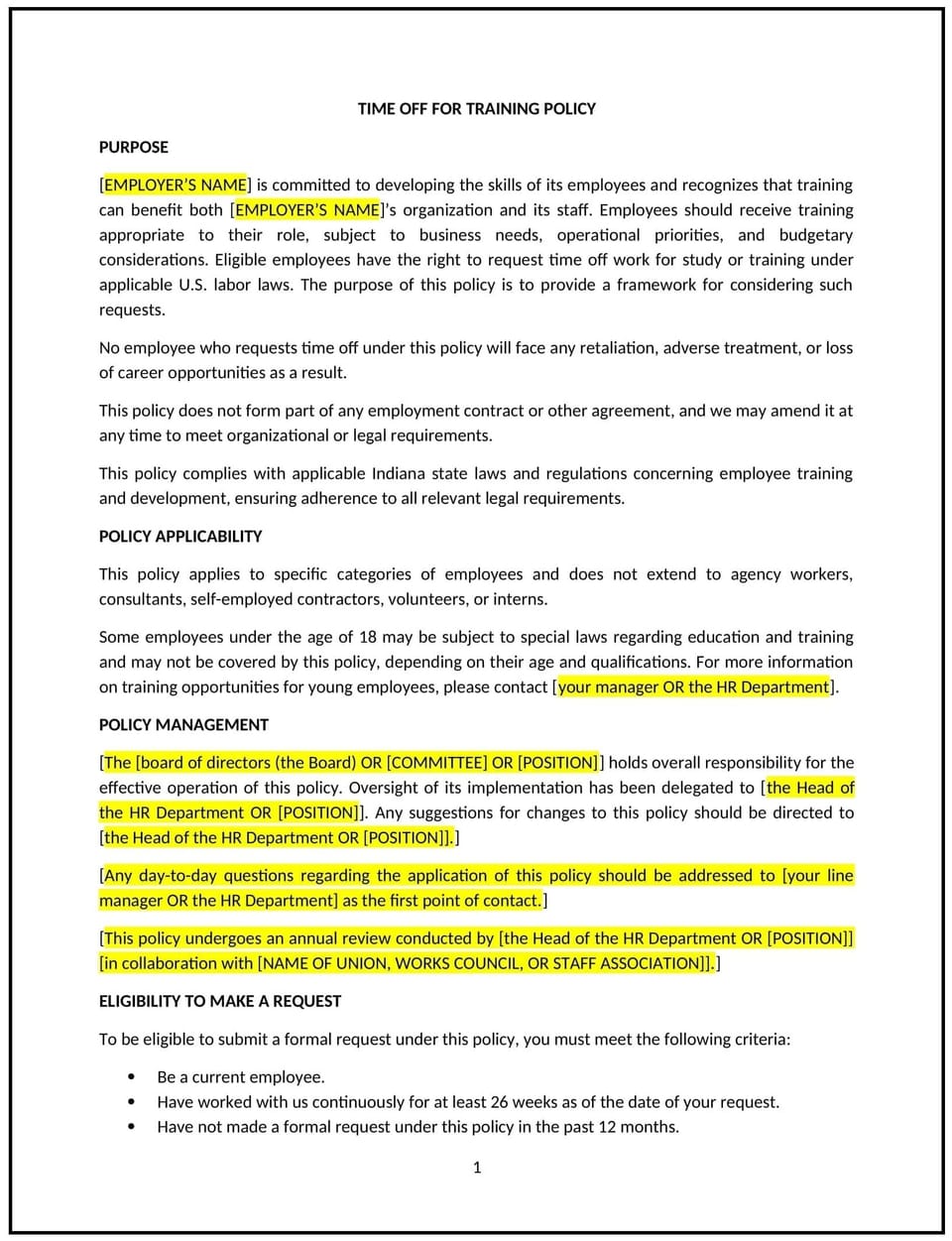Time off for training policy (Indiana): Free template

Time off for training policy (Indiana): Free template
This time off for training policy helps Indiana businesses establish clear guidelines for managing employee absences related to professional training and development. It outlines eligibility criteria, procedures for requesting time off, and expectations for aligning training with business goals. By providing structured support for skill-building opportunities, this policy promotes continuous learning while maintaining workplace productivity.
By implementing this policy, Indiana businesses can enhance workforce capabilities, foster professional growth, and support long-term organizational success.
How to use this time off for training policy (Indiana)
- Define eligible training activities: Specify the types of training or professional development opportunities covered, such as certifications, workshops, conferences, or courses relevant to the employee's role.
- Establish eligibility criteria: Outline which employees qualify for time off for training based on factors such as job role, tenure, and alignment with business objectives.
- Clarify paid and unpaid leave: Clearly state whether training time off is paid or unpaid and if reimbursement for training expenses is provided.
- Provide a request process: Include instructions for employees to request time off, detailing the notice period, approval process, and required documentation (e.g., training schedules or registration confirmations).
- Align training with business needs: Require employees to explain how the training aligns with their role and benefits the business to ensure value from the time invested.
- Address scheduling considerations: Encourage employees to coordinate with their managers to minimize disruptions to operations during their absence.
- Include post-training expectations: Specify requirements for sharing knowledge gained during training, such as presenting key takeaways to colleagues or applying new skills in the workplace.
- Review and update regularly: Periodically assess the policy to ensure it reflects changes in business priorities, training opportunities, or Indiana regulations.
Benefits of using this time off for training policy (Indiana)
Implementing this policy provides several key benefits for Indiana businesses:
- Enhances employee skills: Supports continuous learning and development, helping employees perform better in their roles.
- Boosts retention: Demonstrates a commitment to professional growth, increasing employee satisfaction and loyalty.
- Aligns training with goals: Ensures that time spent on training directly benefits the business’s objectives and workforce capabilities.
- Minimizes disruptions: Provides a structured process for managing absences, maintaining productivity during training periods.
- Promotes knowledge sharing: Encourages employees to share insights gained from training, improving overall team performance.
- Supports compliance: Helps employees stay updated on industry regulations or certifications required for their roles.
Tips for using this time off for training policy (Indiana)
- Communicate the policy: Include the policy in the employee handbook and discuss it during onboarding or performance reviews to ensure employees are aware of its benefits and procedures.
- Encourage planning: Remind employees to plan their training in advance and coordinate with their managers to minimize workplace disruptions.
- Track training outcomes: Keep a record of training sessions attended and their impact on the employee’s performance or business outcomes.
- Offer internal training options: Supplement external training with in-house programs or resources to enhance accessibility and relevance.
- Provide feedback opportunities: Allow employees to suggest training topics or programs that align with their career goals and business needs.
- Stay updated: Regularly review Indiana laws and industry requirements to ensure the policy remains relevant and effective.
Q: What types of training are eligible under this policy?
A: Eligible training includes certifications, workshops, conferences, or other professional development activities that align with the employee's role or the business’s objectives.
Q: Is time off for training paid or unpaid?
A: The policy should specify whether training time off is paid or unpaid. Some businesses may provide paid time off if the training is directly related to the employee's job.
Q: How should employees request time off for training?
A: Employees should submit a formal request with details such as the training schedule, location, and how it aligns with their job role. A specific notice period may also be required.
Q: Can businesses require employees to share knowledge gained during training?
A: Yes, businesses can request employees to share insights, such as through presentations or written summaries, to benefit the team and enhance overall learning.
Q: How can businesses ensure training aligns with their goals?
A: Managers should evaluate training requests to ensure they support the employee’s role and contribute to broader business objectives before approving time off.
Q: Are employees reimbursed for training expenses?
A: Reimbursement policies vary by business. If reimbursement is provided, the policy should outline which expenses are covered, such as registration fees or travel costs.
Q: What happens if training conflicts with business operations?
A: Managers and employees should collaborate to find alternative training schedules or adjust workloads to minimize disruptions.
Q: How often should the policy be reviewed?
A: The policy should be reviewed annually or whenever there are significant changes in training needs, business objectives, or Indiana regulations.
This article contains general legal information and does not contain legal advice. Cobrief is not a law firm or a substitute for an attorney or law firm. The law is complex and changes often. For legal advice, please ask a lawyer.


